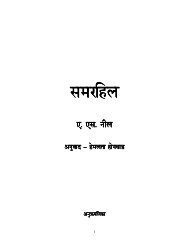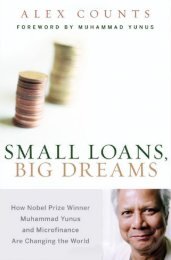Michael Ernest Sadler (1861â1943) - Vidya Online
Michael Ernest Sadler (1861â1943) - Vidya Online
Michael Ernest Sadler (1861â1943) - Vidya Online
You also want an ePaper? Increase the reach of your titles
YUMPU automatically turns print PDFs into web optimized ePapers that Google loves.
who completely overwhelmed the undergraduate. <strong>Sadler</strong> has left on record how, in his second<br />
year at Trinity College, a short course of lectures was announced, to be given in the<br />
University Museum by Ruskin. Tickets were difficult to get because of the popularity of the<br />
speaker. After a warm description of Ruskin’s picturesque appearance, <strong>Sadler</strong> articulates a<br />
favourite conviction when he writes:<br />
Nominally these lectures of Ruskin’s were upon Art. Really they dealt with the economic and spiritual problems<br />
of English national life. He believed, and he made us believe, that every lasting influence in an educational<br />
system requires an economic structure of society in harmony with its ethical ideal. 5<br />
That belief persisted to the end of <strong>Sadler</strong>’s life and is recurrent in his many analyses of<br />
foreign systems of education.<br />
When, in July 1882, the examinations lists were issued, <strong>Sadler</strong> had gained a first-class<br />
degree. A month earlier he had become President Elect of the Oxford Students’ Union, a field<br />
of public debating experience that has produced many an English politician.<br />
During the next few years, while continuing his academic studies, the question of what<br />
career he should choose became increasingly pressing. He was offered a number of jobs—the<br />
headship of a school, a position in India, an invitation to take up journalism. Talent-spotters<br />
who had noted his eloquence at the Oxford Union debates foresaw a political career for him.<br />
But <strong>Sadler</strong> could not commit himself to the monopoly of any one political party. Once again,<br />
the conflicting views that had coloured his upbringing emerged. He analyses his situation<br />
thus:<br />
These variant impressions spoilt me forever for parliamentary life in English politics. The experience that I<br />
gained then and since made me feel that England is united only in supreme moments of common danger, and is<br />
really at least two Englands, each of which inclines to a different form of social organization, and has different<br />
preferences in social ideas, as well as in religious observance and in its attitude to state control. The one is<br />
ultimately feudal and hierarchical; the other oscillates between being individualistic and being bureaucratic. 6<br />
<strong>Sadler</strong> coined the phrase the two-mindedness of England and throughout his life, even to his<br />
last writing, he reiterated this conviction.<br />
From adult education to secondary education<br />
Ultimately, this brilliant young academic decided that what would interest him most after<br />
graduation would be a job in the field of adult education. In May 1885 he became Secretary to<br />
the Oxford University Standing Committee of the Delegacy for Local Examinations. Thus<br />
began an energetic career as travelling lecturer, tutor and organizer of lectures for the working<br />
classes in the industrial centres of the Midlands. On my desk I have before me a typical<br />
brochure and syllabus from 1885 which announces:<br />
Syllabus of a course of lectures on past, present and future of the working classes, and how to better their<br />
condition with a statement and criticism of the views held by famous political economists by <strong>Michael</strong> E. <strong>Sadler</strong>,<br />
B.A. 7<br />
<strong>Sadler</strong> remained as a peripatetic tutor for some nine years. During this time he gave<br />
expositions of the work of Jean-Jacques Rousseau, Adam Smith, Claude Henri de Rouvroy<br />
Comte de Saint-Simon, François-Marie-Charles Fourier, Robert Owen, Frédéric Bastiat and<br />
Ferdinand Lassalle. He was one of the first English scholars both to recognize the significance<br />
of Karl Marx and to give his students an assessment of Marxist doctrine. At the end of a<br />
detailed account of Marx’s life and writings, <strong>Sadler</strong> sums up in 1889:<br />
2



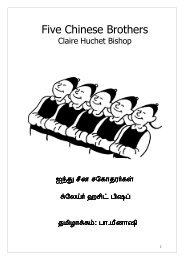
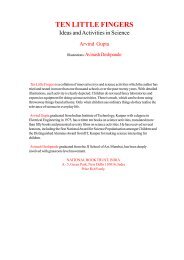
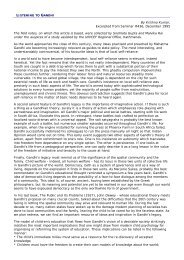
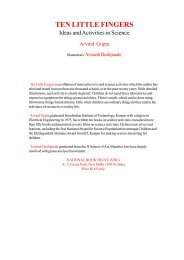
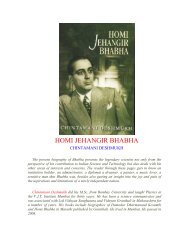
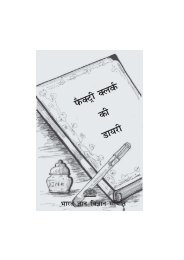

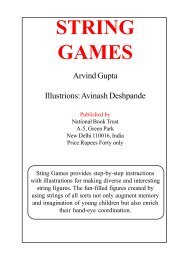
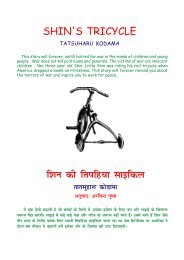
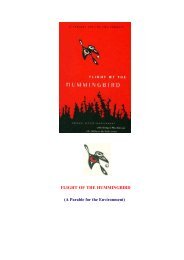
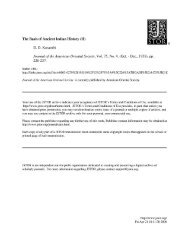
![tq,a] diM+s vkSj vk/qfud ekuo - Vidya Online](https://img.yumpu.com/31264147/1/190x245/tqa-dim-s-vksj-vk-qfud-ekuo-vidya-online.jpg?quality=85)

